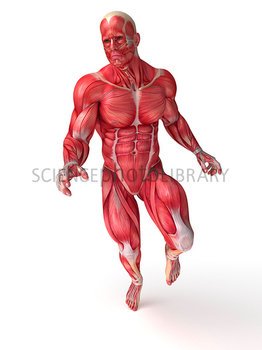
The muscular system is essential to humans and their lives; this allows humans to move their body parts to breathe, digest, and the pumping of blood around the body.
Next time, you take a step, take this into consideration; you are using 200 muscles for each step, making an average amount of 10 000 steps each day.
Looking at life in the positive side, takes less strain on muscles, for a human to smile, you are only using 17 muscles, rather than 43 muscles when you frown.
In those cold winter days and nights when we get shivers from the cold, this is our muscles contracting, sending out energy to warm our bodies. The heat produced by muscles is very important in cold climate.
We are not born with the ability to walk or run but we need to learn muscle control through motor development.
There are three types of muscles, cardiac muscles and smooth muscles which are involuntary muscles meaning you can’t control these muscles as they work automatically for us. The skeletal muscle is voluntary as you can control this type of muscle as you choose to move these muscles. These muscles attach to the bones by tendons. The cardiac muscles make your heart beat and pump blood through your body. The smooth muscles are found in many of your organs, these move food through the digestive system, make you breathe , cough and sneeze.
The cells that make muscles contract and relax back to size are tiny microscopic fibres in the cell that compress by sliding past each other like a sliding glass door opening and shutting again.
The food we eat produces chemical energy that is used by the cells of your muscles , without food and certain nutrients, your muscles are not able to make the energy to contract.
When you hear a person say that they have ‘pulled’ a muscle, this means that you have a torn a muscle just like you can tear a ligament or break a bone. ‘Pulled’ muscles usually repair themselves.
40% of body weight is muscles and you have 630 muscles that move you.
Humans are born with all the muscle fibres. When working out this will tear muscles down, making them thicker and causing them to get bigger and stronger.
The average human heart beats from 60-100 times per minute, whether you sleeping, working out, showering or through everything. The heart is the only muscle that doesn’t tire out.
Rigor mortis is the stiffening of muscles when there is lack of oxygen and energy, this develops about 1-2 hours after death. This is caused when a person dies, the respiratory and circulatory systems stops delivering oxygen and nutrient to the muscles.
When you straighten your knee, you get one group of muscles at the front of the thigh contracting, while the back of the leg muscles relax. These two groups of muscles are called opposing groups. When contraction of opposing groups takes place, they have opposite effects, e.g knee straightening and bending.
The muscle that does the most work over a lifetime is the heart cardiac muscle.
The word muscle comes from the Latin term musculus meaning ‘little mouse’. This could be because of the shape of some muscles or when muscles contract under the skin, it looks like a mouse moving under a rug.
Congratulations @dannydds! You have received a personal award!
Click on the badge to view your own Board of Honor on SteemitBoard.
Congratulations @dannydds! You received a personal award!
Click here to view your Board
Congratulations @dannydds! You received a personal award!
You can view your badges on your Steem Board and compare to others on the Steem Ranking
Vote for @Steemitboard as a witness to get one more award and increased upvotes!